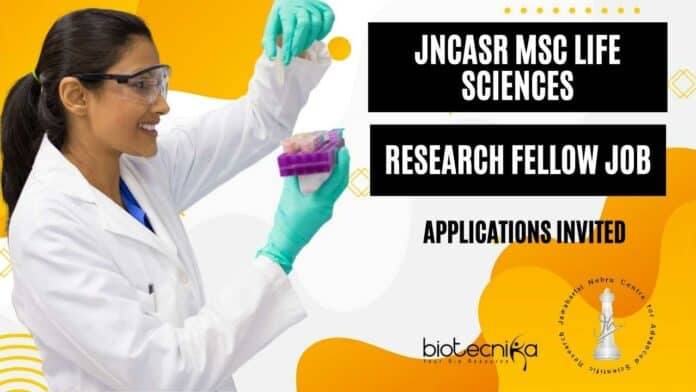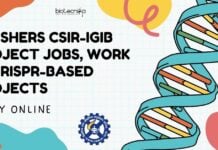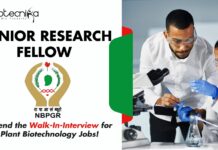JNCASR MSc Life Sciences SRF Job Opening – Applications Invited
JNCASR MSc Life Sciences SRF Job Opening – Applications Invited. R&D position at JNCASR. JNCASR Research jobs for MSc candidates. Interested and eligible applicants can check out all of the details on the same below
Hey there, looking for some help with what kind of possible interview questions can be asked for the role of Senior Research Fellowship-I [SRF] at JNCASR? Then check them out below
This job expires in
Jawaharlal Nehru Centre for Advanced Scientific Research
(An Autonomous Institute under Dept. of Science & Technology, Govt. of India – A Deemed University)
Jakkur Post, Bengaluru – 560 064, INDIA
Advt. No.
Applications are invited for the position of Senior Research Fellow-I to work on “Elucidating the role of exocyst in autophagy and its implications in human diseases” under the guidance of Principal Investigator Prof. Ravi Manjithaya, Molecular Biology and Genetics Unit (MBGU), JNCASR, Bangalore 560 064.
Name of the Post – Senior Research Fellowship-I [SRF]
No. of Posts – 01
Max Age Limit – 28 years
How to Apply –
Interested Candidates are required to send a scanned copy of the duly filled-in Template/Application form
(available on the website) along with scan copies of original testimonials in support of educational qualifications, age, preference, experience, etc. with Brief Resume and cover letter to Prof. Ravi Manjithaya, Autophagy Lab, MBGU through email ([email protected]) latest by Aug 5th, 2023.Note:
- Candidates are required to provide their Skype ID, email address and mobile number.
- Shortlisted candidates may be invited for an online interview.
- No TA/DA will be paid for attending the interview in person.
Essential Qualification:
- Post Graduate Degree in Life Sciences/ Post Graduate degree in the professional course selected through a process described through any one of the following
a.) Scholars who are selected through National Eligibility Test- CSIR-UGC NET including lectureship and GATE
b.) The selection process through National level examinations conducted by Central Government Departments and their Agencies and Institutions such as DST, DBT, DAE, DOS, DRDO, MHRD, ICAR, ICMR, IIT, IIT, IISc, IISER, etc. - Two years of research experience
- Experience with yeast handling, Molecular Biology techniques, Biochemical techniques such as Western Blotting, Protein purification, Mass spectrometry, and Analysis of Mass spec data.
Desirable Qualification: Interest and knowledge in Yeast Biology and Biochemistry. Preference will be given to candidates with prior Research experience.
Remuneration – Rs. 35,000 plus 24% HRA
Click here to download the application format
Check the notification below
Hey there, looking for some help with what kind of possible interview questions can be asked for the role of Senior Research Fellowship-I [SRF] at JNCASR? Then check them out below
- Question: Can you elaborate on your research experience and how it aligns with the project’s focus on “Elucidating the role of exocyst in autophagy and its implications in human diseases”? Answer: I have two years of research experience, which has primarily focused on studying autophagy in yeast. I have been involved in investigating the role of the exocyst complex in autophagy regulation and its relevance to human diseases. My expertise in yeast handling, molecular biology techniques, and biochemical techniques such as Western Blotting and Mass spectrometry have enabled me to contribute to this field significantly.
- Question: How do you plan to apply your knowledge and skills in yeast biology and biochemistry to the research project? Can you give us an example of a study you conducted in yeast biology? Answer: My interest and knowledge in yeast biology are essential for understanding the cellular processes involved in autophagy. For instance, in a previous study, I explored the molecular mechanisms of selective autophagy in yeast, particularly focusing on how specific proteins are targeted for degradation by the autophagy machinery. This understanding can be leveraged to investigate the exocyst’s involvement in autophagy and its implications in human diseases.
- Question: The project involves using various biochemical techniques such as protein purification and analysis of Mass spec data. Can you share your experience with these techniques and how they contribute to the project’s objectives? Answer: I have hands-on experience in protein purification and Mass spectrometry analysis, which have been instrumental in identifying and characterizing key components of the autophagy process. For instance, I successfully purified autophagy-related proteins from yeast cells and performed Mass spec analysis to identify their post-translational modifications. These techniques are essential for deciphering the role of the exocyst complex in autophagy and its potential implications in human diseases.
- Question: How have you demonstrated your ability to work in a research team environment, especially in collaborative projects? Can you provide an example of a collaborative research project you were part of? Answer: I believe effective teamwork is crucial for successful research outcomes. In a recent collaborative project, I worked with researchers from different disciplines to investigate the crosstalk between autophagy and cellular stress responses. Together, we combined expertise in yeast genetics, biochemistry, and cell biology to unravel the intricate molecular interactions that occur during stress-induced autophagy. This experience has strengthened my collaborative skills and adaptability in interdisciplinary research settings.
- Question: The project requires analyzing complex data sets from Mass spectrometry. How do you ensure accuracy and reliability in your data analysis, and how do you handle challenges that may arise during the process? Answer: Data analysis in Mass spectrometry can be intricate, and accuracy is paramount. To ensure reliability, I follow standard data processing protocols, perform statistical analyses, and validate results using multiple approaches. In case of challenges, I seek guidance from experts in the field, collaborate with bioinformatics specialists, and conduct thorough validation experiments to ensure the robustness of my findings. Rigorous quality control measures and critical evaluation of the data are essential steps in handling such complex datasets.
Editor’s Note: JNCASR MSc Life Sciences SRF Job Opening – Applications Invited. Please ensure that you are subscribed to the Biotecnika Times Newsletter and our YouTube channel to be notified of the latest in the industry. Follow us on our social media like Twitter, Telegram, Facebo






























